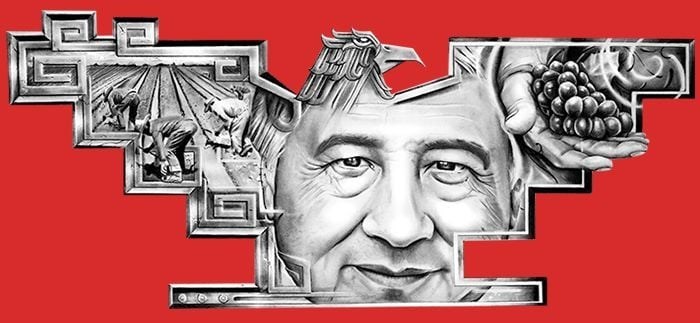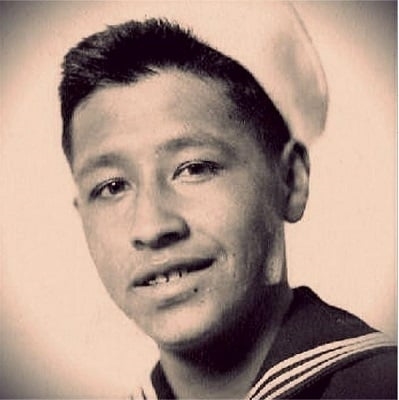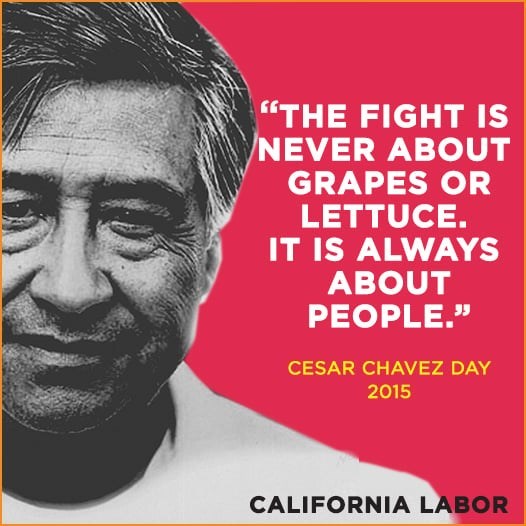 |
| (Photo Courtesy of César E. Chávez Foundation) |
Born on March 31, 1927, Cesar Estrada Chavez grew up close to Yuma, Arizona. His mother Juana Estrada Chavez and father Librado Chavez owned a store and small house, where they worked the land on the farm that totaled over one hundred acres that Cesar Chavez's grandfather, Cesario Chavez, had established. The home where Cesar was born was taken away by fraud by dishonest Anglos. The deal was made that Cesar's dad needed to clear eighty acres of land and in return, he would get the deed to forty sections of the land that included the home that was Chavez's birthplace. Even with the completion of the task the landowners went back on the agreement and sold to a man named Justus Jackson. This, of course, angered Cesar's father and he went to a legal counselor in order to win back what he felt was his rightful land. The lawyer seeing an easy way to make money convinced Chavez's father to pay him through a loan to start the legal proceedings. When his father wasn't able to pay the interest on the loan, the lawyer bought it back and sold it back again to the original owner. The lessons learned by Cesar about injustice were never forgotten after that. The family then joined the many migrant laborers streaming into California. The family settled and lived in La Colonia Barrio in Oxnard for a short time, eventually returning to Arizona a few months later. By June 1939, the family was back in California, this time living in San Jose, in the barrio Sal Si Puedes the English translation being "Get out If You Can". Chavez worked beside his family in the field of California, with other cultures and people and learned a lot of similar stories with conflict, struggle, and displacement. He didn't like school as a child and suffered through a lot of racist remarks. About the time he progressed from the eighth grade, his father suffered a major accident that did not allow for him to work. Chavez did not want his mother to have to bear the burden of providing for the family so he did not continue his education but became a migrant farmer to support his family. He continued to work as a laborer until finally deciding to join the United States Navy.
 |
| Cesar Chavez in the US Navy (Photo Courtesy of César E. Chávez Foundation) |
In 1946, Chavez joined the United States Navy because he thought that he would learn skills in the Navy that would help him later when he returned to civilian life. He described it as "It was the worst two years of my life." When he got back he and his girlfriend Helen Fabela got married in 1948. During their honeymoon they visited the Californian Missions which was from Sonoma to San Diego. They settled in Delano and started a family. They had eight children in total. The first one was named Fernando. Chavez returned back to San Jose where he met a priest named Donald McDonnell and he was influenced by him. They talked about farm workers and strikes that they did to have good working environments. When Chavez was in San Jose he read about St. Francis and Gandhi and nonviolence. Another person came into his life and his name was Fred Ross. Ross was part of this organization called the Community Service Organization (CSO) and his dream was to make people come together and make their community better and he got Chavez to help and his first task was voter registration.
 |
| (Photo Courtesy of César E. Chávez Foundation) |
In 1962, Cesar had a dream to make a union that would give union contracts that had effectively organized most of that industry. He, his brother, and a lady called Dolores Huerta did this and they made the United Farm Workers Organization (UFW). Chavez's brother Richard Chavez designed the UFW's Eagle and Cesar choosing black and red colors for their flag. Cesar made reference to the flag by stating, "A symbol is an important thing. That is why we chose an Aztec eagle. It gives pride . . . When people see it they know it means dignity." In 1962 50,000 dues for paying members. The reason was Cesar Chavez's tireless leadership and nonviolent tactics that included the Delano grape strike, his fasts that focused national attention on farm workers problems, and the 340-mile march from Delano to Sacramento in 1966. The farm workers and supporters carried banners with the black eagle with HUELGA (strike) and VIVA LA CAUSA (Long live our cause). The marchers wanted the state government to pass laws which would permit farm workers to organize into a union and allow collective bargaining agreements. It was the beginning of La Causa, a cause that was supported by organized labor, religious groups, minorities, and students. Cesar was willing to sacrifice his own life so that the union would continue and that violence was not used. Cesar fasted many times.
Cesar Estrada Chavez died peacefully in his sleep on April 23, 1993, near Yuma, Arizona, a short distance from the small family farm in the Gila River Valley where he was born more than 66 years before.
Page created on 6/13/2016 12:00:00 AM
Last edited 6/13/2016 12:00:00 AM
